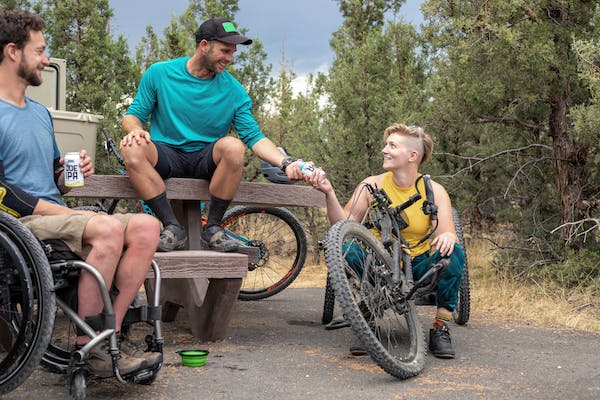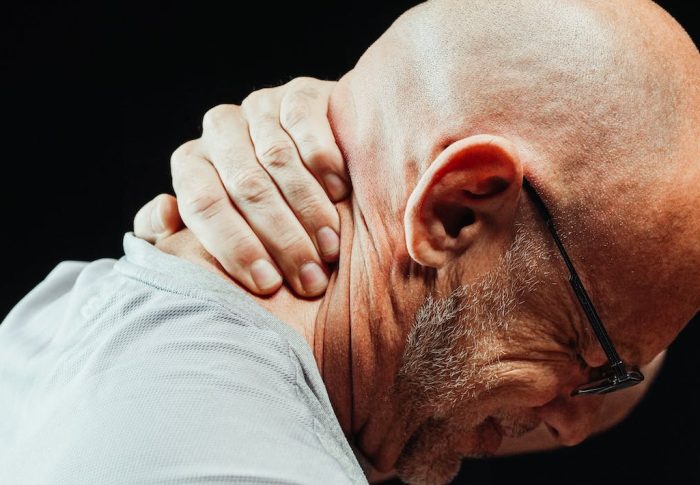Am I disabled?
I recently watched a video where 2 people discussed various scenarios in which they would (or wouldn’t) be considered disabled and it got me thinking about my situation.
I have severe arthritis in various parts of my body. A couple of years ago I had an operation that was meant to prolong the use of my left ankle. Unfortunately, it’s so damaged that, even though they did extensive work (micro-fracturing to try and regenerate the cartilage), it wasn’t enough and the only option I have left is to have it fused (they’d literally fuse the bones to prevent the joint moving). We’re putting off that operation as long as possible by using an external brace (orthotic) that does the same job, the joint is completely immobilised but I can take the brace off if I want to, for example, wear high heels!
The pain in my neck and back is kept to a bearable level by painkillers and physio but this doesn’t mean it doesn’t impact me on a daily basis. Of course, it hurts physically but chronic pain is mentally draining too. I also have chronic fatigue that means I have to consider the level of activity I can manage but this is still a work in progress and I frequently overdo things. See this blog for how much time and effort go into managing chronic illness.
But – do I considered myself disabled?!
On the surface, no I don’t. I just get on with my life. I have a fairly standard life, nothing particular spectacular but I’m content and I do most of the things I want to do.
The social model of disability looks at whether there are things in society, either physically, or the way the world works, that dis-able someone from functioning fully. But how far should we expect society to bend in order to accommodate one person’s needs?

For some people it’s obvious; if you’re in a wheelchair and the only way into a building is via stairs, the environment is disabling your entry into the venue, a ramp or lift is needed. But what alterations would someone with a learning disability need, or autism? How about changing the configuration of the office to accommodate someone with anxiety disorder? What flexibility would you offer someone managing epilepsy? What if someone needs different alterations on different days depending on how their condition is impacting them? Society tend to be confused by hidden or changeable conditions such as mine.
If I had my way, I would have about 36 hours each day, I would sleep for an extra 4 hours, I would use 4 hours to do the things I want to do (hobbies, socialising etc) and the other 4 hours would be spent resting. But this is not something society can offer me!
I work part time, part of the reason for this is because I’m studying to be a counsellor but this is an evening course so in theory I would continue working full time and fit course work in around my paid work. However, levels of fatigue dictate this isn’t possible, working part time means I can share my energy between my commitments. With part time work comes a lower salary, I would prefer to work full time, I have the intellectual capability to work full time in a much higher paid job but my health doesn’t allow this – what “reasonable adjustment” that would solve this one?
My ankle orthotic means that slopes and some steps are awkward – my foot and knee have to work harder but I can’t expect the world to be designed to suit my needs, can I? I find it much harder to stand on public transport because my ability to balance is impaired but no one can tell I need a seat so don’t get me started…! Very few weeks post recent ankle op I was non-weight bearing, balancing on crutches on the underground, did anyone offer me a seat?? I’ll just leave it there!
My orthotic is very well designed to fit inside standard shoes but I’m restricted with the type of shoe I can wear, I could probably do with a left shoe half a size bigger than the right but I don’t want to buy 2 pairs of shoes!
Evenings are a tricky time for me. Pain and fatigue are at their worst and getting to bed on time is important. But I don’t want to miss out on social activities or hobbies. I find it very difficult to send my apologies when I’m “tired”, I don’t want to be seen as unreliable or considered a flake, that’s not in my nature. I’m more likely to push myself beyond my limits because I’m intolerant of my restrictions. But I can’t expect evening activities to be brought forward so that I’m not constantly pushing my body further than it’s really capable, can I?
If I was being obnoxious, I could say that society is disabling me by not providing me with specific adjustments for my needs but I don’t know what entitles me to adaptations?
Another method for measuring disability is whether you could just “up and off” if the worst happened. Could I cope with just the clothes on my back in an unfamiliar environment?

Most people with chronic illness are reliant on regular medication, I am no exception – I take a multitude of medication everyday and (when errors have occurred with supply) me off meds is not pretty! Without my thyroid hormone, after a few days I start to slow down, the list of problems is extensive: blood pressure irregularities, low body temperature and memory problems being just the start! Without daily migraine preventative, other painkillers and psychiatric medication, functioning is very difficult, if not impossible!
I manage my mental health to such an extent that I would now say I’m recovered. However, maintaining my health requires certain familiar routines, I don’t know how I’d cope in an unfamiliar environment. Knowing me, I think I’d cope fine for a few days, I’d turn my attention to supporting other people but after about 2 weeks my cracks would start to show, as my energy ran out, my coping mechanisms would break down.
I don’t think I identify as disabled but it’s interesting to think how my life is different because of my chronic conditions. Other people find life a lot easier than I do, perhaps I could ask them to make alterations so we’re on more of a level playing field but I’m not bold enough to be that person who stands up and demands the world adjust for me. It’s different in America, an environment without alterations is unusual but in the the UK we still expect the individual to stand up for themselves. I find it easier to struggle on rather than face judgments from people who don’t want to help me out.




